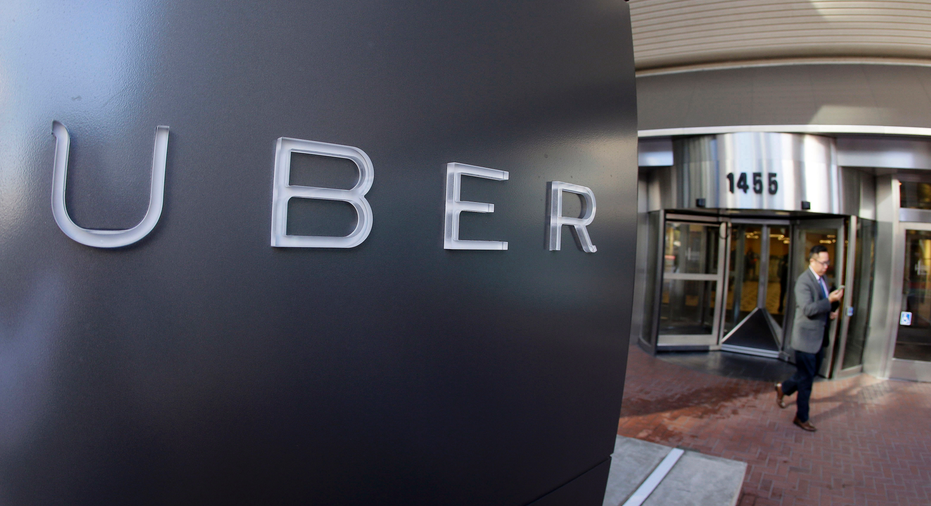New blow for Uber: Top EU court likens it to taxi service

BARCELONA, Spain – Uber suffered a new blow Wednesday as the European Union's top court ruled that it should be regulated as a transport company instead of a technology service, a decision that crimps its activities around Europe and could weigh on other app-based companies too.
Taxi drivers honked horns to celebrate the ruling, which punctures Uber's image as the pioneer of a new gig economy that's setting its own rules while governments clamber to keep up.
Uber — which is wrapping up a particularly punishing year — sought to downplay the decision, which might only affect the company's operations in four countries. Uber said it will try to keep expanding in Europe anyway.
The decision by the Luxembourg-based European Court of Justice in theory applies to ride-hailing services around the 28-nation EU. But the ruling leaves it to national governments to decide how and whether to change the way they regulate Uber and similar services.
Uber has gained a strong foothold and customer base in most European countries, adapting its multiple services to bend to local rules when faced with legal challenges. Its hallmark low-cost service — hooking up unlicensed freelance drivers with riders via an app — is already banned in many European cities, and instead Uber's services are much like taxis, just more flexible and sometimes cheaper.
Some other internet-based businesses fear the ruling could suppress innovation and usher in other restrictions, as European authorities look for ways to regulate companies that operate online and outside traditional sectors and don't fit in with existing laws.
The decision stems from a complaint by a Barcelona taxi drivers association, which wanted to prevent Uber from setting up in the Spanish city. The taxi drivers said Uber drivers should have authorizations and licenses, and accused the company of engaging in unfair competition.
Arguing its case, San Francisco-based Uber said it should be regulated as an information services provider, because it is based on an app that connects drivers to riders.
The court said in a statement that services provided by companies like Uber are "inherently linked to a transport service" and therefore must be classified as "a service in the field of transport" within EU law. It says the EU directive on electronic commerce does not apply to companies like Uber.
Uber said in a statement that the ruling "will not change things in most EU countries where we already operate under transportation law" and that it will "continue the dialogue with cities across Europe" to allow access to its services.
The company has already been forced to adhere to national transport legislation in several EU countries, where its offerings are limited and it is regulated like a private car service.
Poland, the Czech Republic, Slovakia and Romania are the only countries where the company still offers so-called "peer-to-peer" services linking freelance drivers with riders, and the countries where Wednesday's ruling might have a direct impact.
But Mike Ramsey, analyst at research firm Gartner, called Wednesday's ruling a "giant blow to Uber's business model. The company has been walking the line for a long time. For Uber to keep existing in these markets, it may have to change its model entirely."
In Spain, the company operates through tourism transportation licenses issued in some cities, but its unlicensed service that prompted the lawsuit is banned.
Taxi drivers in Barcelona's streets honked their horns in victory.
"It was about time to put an end to the unfair competition of the gig economy companies that are no more than killer whales in a fish tank," said Raul Lopez, a taxi owner who has been driving the streets in the Mediterranean port city for 17 years.
The Barcelona-based law firm representing Elite Taxi, the association that filed the lawsuit, also hailed the ruling. SBC Abogados said in a statement that the ruling's consequences "can be extrapolated to other businesses that keep trying to avoid legal responsibilities in the services that they provide."
And the European Trade Union Confederation said in a statement that the judgment will help drivers get fair wages and conditions. It said the ruling "confirms that Uber does not simply exist 'on the cloud' but is well established with its wheels firmly on the road."
However, a group representing online companies warned that the ruling goes against EU efforts to encourage innovation and help European entrepreneurs compete with U.S. and Asian rivals.
"It's a precedent and a door-opener for online innovators to be to be subjected to national or sectoral rules in the future," Jakob Kucharczyk of the Computer and Communications Industry Association, told The Associated Press. He said it is too early to say which other companies might be affected.
Uber has had a roller-coaster year that also included the ouster of its CEO, sexual harassment allegations and the revelation that it covered up a massive breach of customers' data.
The EU ruling is separate from a string of ongoing legal challenges Uber has faced around the world, including in Britain, where authorities don't want to renew its license, citing a lack of corporate responsibility.
In the U.S., Uber and competitors such as Lyft are governed by a patchwork of state and city regulations. Generally, Uber has been successful in getting its way, leveraging its popularity to lobby governments. More than 40 states have enacted statewide ride-hailing regulations.
___
Charlton reported from Paris. Tom Krisher contributed from Detroit.



















